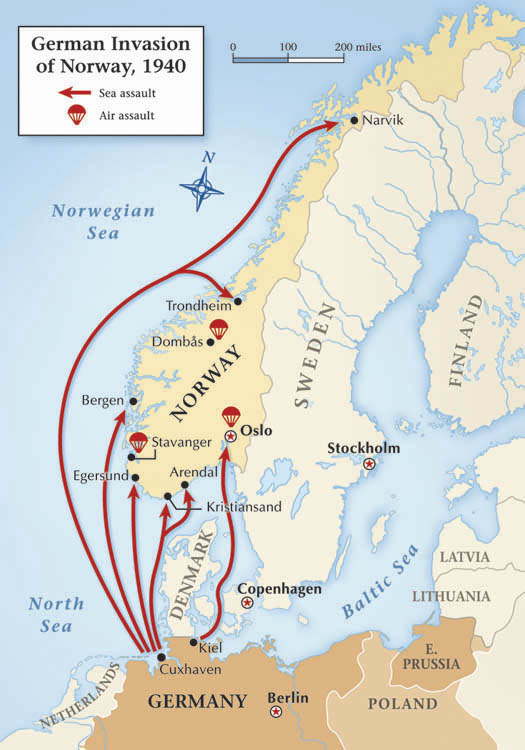Although Churchill was roundly criticized for his role in the failed Norwegian campaign, the debacle, ironically, opened the door for him to become prime minister—and lead England to victory.
This post, which is from the Winter 2011 issue of MHQ, is only a snippet. Please purchase the Winter 2011 issue of MHQ: The Quarterly Journal of Military History to read the entire article.
On April 15, 1940, utterly alone and deeply worried, the commander in chief of Germany’s armed forces, Adolf Hitler, sat in the far corner of a room full of busy staff officers, telephones, maps, and messengers at the Reich Chancellery in Berlin. A witness described the führer as “staring vacuously as if immersed in some apathetic meditation; he appeared to be expecting his sole salvation from some phone call.” Hitler’s apprehension was warranted. The Norwegian operation was only eight days old but it had already cost Germany the cruisers Blücher, Karlsrühe, and Königsberg. The heavy cruiser Admiral Hipper, pocket battleship Lützow, and battlecruiser Gneisenau had been damaged, and eleven modern, combatworthy destroyers sunk or scuttled. German vessels had just been driven from the port of Narvik, a vital rail terminal, by a superior British naval force (though it would take French and Norwegian troops until May 28 to recapture the town). The most stunning blow to Hitler was the painful recognition that he had initiated this embarrassing debacle over the strong objections of the German army’s leadership, which had warned him it was the wrong action at the wrong place and at the wrong time.
The wrong place was Scandinavia, which was destined to be a World War II backwater. The wrong time was when Nazi Germany’s military staffs and logistical organizations were only three weeks from launching a 136-division surprise assault on Holland, Belgium, and France. Since the Wehrmacht invasion would face 149 divisions of the Western Allies, many of which were behind formidable defenses, there was every reason for Berlin not to have eight army divisions, much of its air arm—the Luftwaffe—and most of its navy fully engaged in Scandinavia.
Meanwhile in London, Britain’s First Lord of the Admiralty, Winston Churchill, was raising the ire of his commanders. General Sir William Ironside, chief of the Imperial General Staff, described him as a desperate man who seemed to be more of a liability than an asset, a view that other British commanders would occasionally embrace well after the Norway campaign.
“One of the fallacies that Winston seems to have got into his head,” said Ironside at the time, “is that we can make improvised decisions to carry on the war by meeting at 5 p.m. each day….War cannot be run by the staffs sitting round a table arguing. We cannot have a man trying to supervise all military arrangements as if he were a company commander running a small operation to cross a bridge.”
In Norway, both Hitler and Churchill would gamble not only their careers but also the futures of their respective countries. One would be elevated despite a disastrous performance. The other would gain a flashy, short-term victory—that four years later would help bring about a devastating failure .
.
This post is only a snippet. Please purchase the Winter 2011 issue of MHQ: The Quarterly Journal of Military History to read the entire article.





